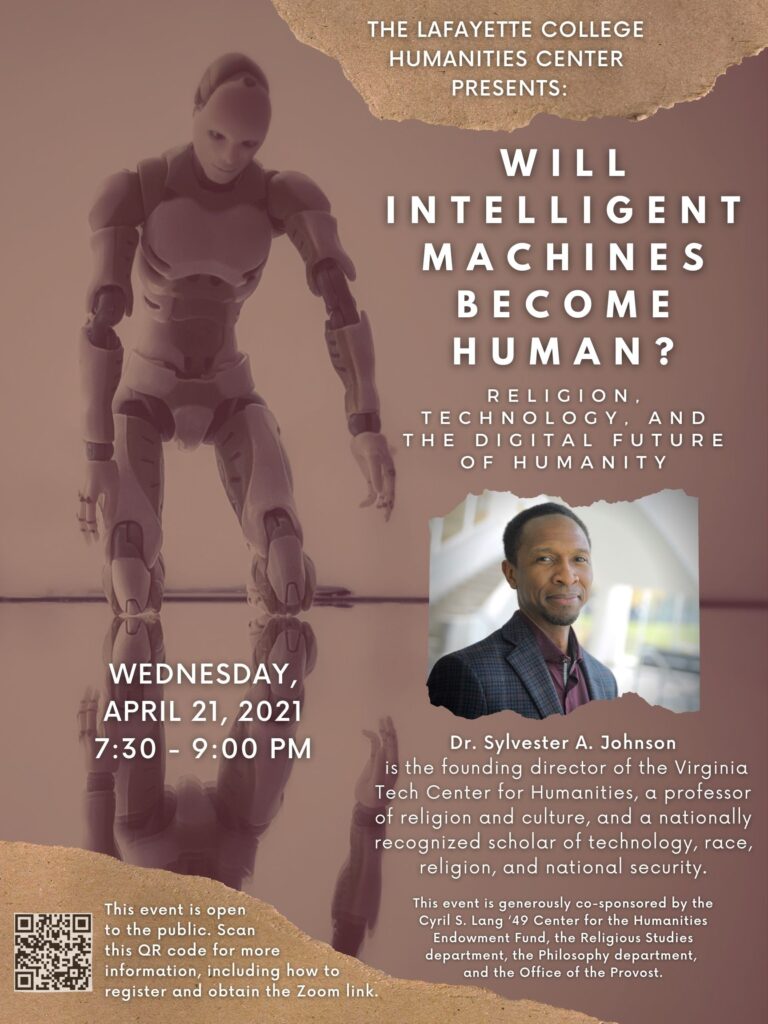Nationally recognized scholar will lead a conversation at Lafayette on the complexities of artificial intelligence
 By Stella Katsipoutis-Varkanis
By Stella Katsipoutis-Varkanis
On April 21, Sylvester Johnson—founding director of the Virginia Tech Center for Humanities and a nationally recognized scholar specializing in the study of technology, race, religion, and national security—will deliver a special guest lecture, “Will Intelligent Machines Become Human? Religion, Technology, and the Digital Future of Humanity.”
Here are four reasons you should mark this free virtual event on your calendar:
The relationship between artificial intelligence and the human being is timely.
“… Especially as our nation and world try to work their way out of the current pandemic that has compelled societies to explore and realign our daily lives with new technologies, such as Zoom and Google Meet,” says Eric Ziolkowski, Helen H.P. Manson Professor of the Bible, head of the Department of Religious Studies, and co-leader of the Humanities Center Initiative with Alessandro Giovannelli, associate professor and head of the Department of Philosophy.
In his discussion, Johnson will tackle questions like “Can an assemblage of machine parts be a person?” and “What distinguishes humans from mere objects?” The use of intelligent machines in the form of artificial intelligence or machine-learning applications for human enhancement, Johnson proposes, has crystallized these age-old conundrums in a new key. Johnson’s lecture will explore and explain the consequences of current technology innovation that combine humans with intelligent machines for applications ranging from medical therapy to military super-soldiers.
It’s an opportunity to learn from Johnson, a widely respected scholar in his field.
Johnson’s award-winning scholarship is advancing new approaches to understanding the human condition and social institutions of power in an age of intelligent machines and other forms of technology innovation. From 2014 to 2017, Johnson led a 20-member team of humanists and technologists at Northwestern University to develop a successful proof-of-concept for a machine learning system that could assist in scholarly research of an early English corpus using named-entity recognition and topic-modeling. In 2017, he joined the faculty of Virginia Tech, where he advances research at the intersection of humanity and technology.
Johnson’s lecture will appeal to community members across disciplines—on the Lafayette campus and beyond.
“The vision of Lafayette’s Humanities Center is driven by the urgent need for bringing humanistic methods of learning and engagement to bear in preparing 21st-century students to confront the intellectual, social, environmental, and existential challenges of a politically fractured but—to a growing extent—technologically interconnected global society,” says Ziolkowski. “The subject of Johnson’s lecture engages directly with some of those challenges.”
You’ll be supporting Lafayette’s Humanities Center.
The establishment of the Humanities Center at Lafayette is one of the ambitious academic initiatives President Alison Byerly has introduced. It is Ziolkowski’s hope that the lecture, aside from its inherent value, will help draw attention to the Humanities Center’s commitment to community outreach both at Lafayette and in the city of Easton.
 By Stella Katsipoutis-Varkanis
By Stella Katsipoutis-Varkanis
